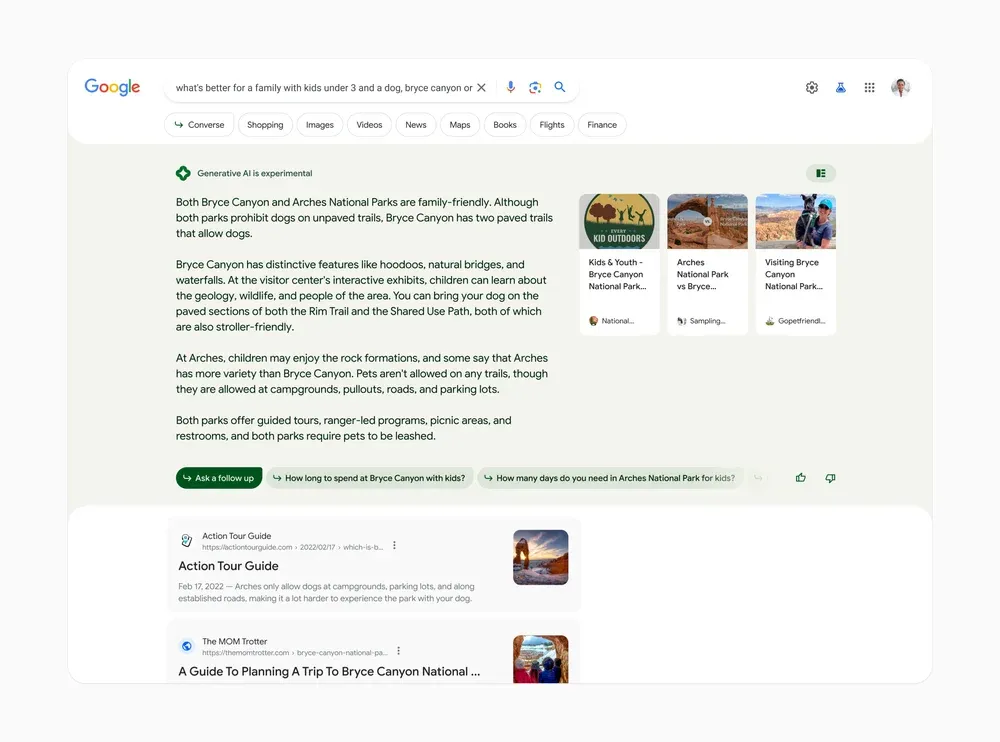Following the launch of the new OpenAI-powered Bing in February, Microsoft CEO, Satya Nadella, said he wanted the world to know that they “made Google dance”. Fast forward a few months, and it’s safe to say that Google – the proverbial 800 lb gorilla – now has its dancing shoes firmly on.
At its recent I/O conference, Google finally unveiled how it plans to incorporate generative AI into its core search offering. In short, the search giant is going all in on AI – and the way we discover and access information online is set to fundamentally change.
What will the future of search look like?
Google has taken the radical step of incorporating generative AI into the most valuable real estate on the internet: its search engine results page (SERP).
In the near future, users will be provided with “AI snapshot” responses to their queries, rather than wading through snippets, FAQs, and links. These snapshots will provide high-level answers and overviews, while suggesting further reading for users who want to dive deeper into the subject. Google calls this new-look search interface an “integrated search results page”.

In practice, Google is attempting to use generative AI to help users resolve their queries more efficiently. Suppose you have a specific, complex question, or a query that involves a comparison. Instead of breaking your search up into a series of smaller queries, Google’s new generative AI capabilities will do the heavy lifting for you, providing a more complete answer instantly.
Under the AI snapshot, users will be presented with the option to ask a follow-up question, or select from a series of suggested prompts. Selecting any of these options will take the user away from the integrated results page, and into “conversational mode” – something more reminiscent of ChatGPT or Bard.
Google’s Search Generative Experience (SGE) is a fundamental departure from the “10 blue links” model that has become synonymous with search for the past two decades.
Will all queries be answered by AI?
Not every query type will be part of Google’s Search Generative Experience. “Your money, your life” (YMYL) queries are off-limits for now, as are queries related to medicine and civic information. Google has made it clear that they’re holding this new search experience to “an even higher standard when it comes to generating responses about certain queries where information quality is critically important.”
But where Google expects its Search Generative Experience to add real value is in the realm of “No One Right Answer” (NORA) queries that go beyond basic informational search.
Take the example of planning a three-day trip to New York. You can find restaurants, book hotels, check museum opening times, buy theater tickets, and plan journeys yourself – but that takes dozens of individual searches, and involves visiting just as many websites. But within the SGE, Google will be able to provide the user with an itinerary, formed through the completion of multiple, disparate searches that are synthesized into a single answer.
PaLM 2: Google’s new LLM
All of this has been made possible by the arrival of PaLM 2, Google’s newest large language model, a development aimed specifically at enhancing its AI chatbots and other text-related services.
This advanced LLM has been trained across an expansive set of over 100 languages, and showcases exceptional abilities in coding, mathematics, and creative writing. Google revealed that there are actually four distinct versions of PaLM, with the most compact variant, named "Gecko", specifically designed to function on mobile devices.
PaLM 2 signifies the continuation of Google's work on the original PaLM model from 2022, and PaLM-E, a multimodal model, launched earlier this year. Google has also developed a specialized LLM for the medical field, known as Med-PaLM 2, aimed at providing accurate responses to medical queries. Google shared that this system achieved an impressive 85% accuracy rate on the US Medical Licensing Examination.
While the incorporation of AI in the medical field raises substantial ethical considerations, Google anticipates that Med-PaLM could potentially identify medical conditions from image analysis, such as X-rays.
Has Google retaken the initiative in the AI wars?
Search is only one theater in the battle for AI supremacy – but it’s a big one. The introduction of the Search Generative Experience has certainly helped to dispel any concerns that Google was losing in the application of generative AI. The 800 lb gorilla might be slow, but it’s still the market leader – and SGE will likely be enough to secure its supremacy over Bing for the time being.



 Follow us on LinkedIn
Follow us on LinkedIn


